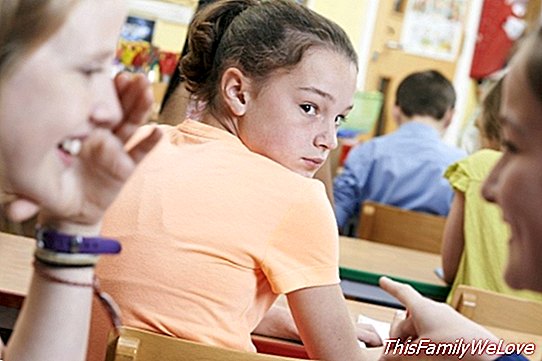Bullying: how to prevent social rejection from the family

Bullying or bullying It is a growing problem and to stop it you need prevention. Before arriving at the classrooms, there is much to do at home, within our own family to avoid isolation and encourage the socialization of children from a young age, since the absence of contact with others can contribute to the development of social phobia and rejection by others, and as a consequence becoming a potential victim of the harasser.
The psychologist Jorge López Vallejo says that "having an adequate socialization during childhood will act as protection, as a force for the child against fear of rejection and social phobia." Isolation, overprotection, control over children by parents with little contact with the outside, instead it can facilitate it ".
Parental behaviors that favor social phobia
Children must gain security in their social relationships and parents must guarantee opportunities for their children to interact with other children of their age, and thus favor the exchange of emotions and thoughts.
However, as the psychologist López Vallejo explains, "it is vital to know the behaviors of parents who, under certain emotional states, can disfavor this social contact, so it is important to intervene therapeutically on parents so that the problem of phobia social, fears and rejections, do not appear in children, with clear examples you can see these behaviors and their results. "
1. Shame. There are parents who are excessively concerned about the opinion of others, who do not promote social contact. These parents can use shame as a method of control for their children. Consequently, they will avoid socializing or alert their children to possible disasters if they are related. They will anticipate failure by creating self-fulfilling prophecies: "What a shame, you will make a fool of yourself ..."
2. Depression. When one of the parents is depressed and the child spends most of their time with them, they may have more difficulties in their social relationships. A child who is ignored most of the time by his parents will begin to manifest a lack of reaction to the environment or, on the contrary, may present constant crying and aggressive behavior.
3 Brothers. Families with several children, in themselves, generally facilitate contact with others, because they are children who, from the earliest childhood, share and live in a group. A family with only one child needs to work harder to stimulate and relate to other children. It is very beneficial, in the second case, to favor their sociability with the nursery, sports and cultural group activities etc.
4. Diseases. The presence of diseases that affect the physical appearance or keep the children hospitalized long periods in the hospital favors the hyperprotection of the parents, but it will always depend on how these limitations are faced.
For example, in the case of acne, overweight, any difference with the rest can be isolated from the group avoiding situations or on the contrary can interact with others, thus strengthening their self-esteem.
If the isolation is forced, for example, the child who suffers from an illness and must be in bed for a long time, will have fewer opportunities to socialize, since he will not be able to go to school, do sports, or go out with his classmates. Normally, in this case it will be necessary to facilitate contact at home with friends' meetings.
In general, the problems that parents suffer can reduce the chances of children to be happy, in our hands is the responsibility to ask for psychological help to overcome our limits.
Bullying can facilitate social phobia and social phobia to fuel bullying
A child who is rejected by the group feels fear, shame, anxiety, sadness, anger; They are all very destructive emotions if you do not share them with an adult to get help. Bullying causes a forced isolation that increases what the parents had created.
The child will maintain with his isolation a constantly mockery, insults, humiliations by his companions, with time he becomes weaker, believing his executioners, even comes to believe that he deserves it. The bullied child tries to pass unnoticed, as a defense mechanism is isolated more of the group, leaving to relate for fear of being humiliated, so that their opportunities to make friends are reduced.
"A child who suffers from bullying at school due to initial isolation or social phobia, at home starts to behave differently, for example, is more aggressive or more passive, is sad, is afraid to sleep alone, does not want to go to class, he complains of pain before going to school, he pees on his bed etc, and this is when we must be alarmed, "says Jorge López Vallejo
These behavioral and physical symptoms are messages that must be heard, since in most cases children do not verbalize that something happens to them until the harassment has been established. And he adds, "if we detect sudden changes in behavior or certain symptoms in the child, we must rule out that he may suffer, social phobia or worse, an involution that has provoked bullying."
Marina Berrio
Advice: Jorge López Vallejo. Psychologist.López Vallejo Psychology




